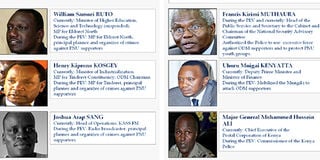Ocampo Six ordered to appear at Hague

A picture released on December 15, 2010 by the Hague-based International Criminal Court (ICC) shows a combo of the six Kenyans, named today by prosecutor Luis Moreno-Ocampo, alleged to have masterminded the 2007-08 post-election violence that claimed 1,500 lives. ICC took charge of trying key suspects in connection with what was the country's worst violence since independence in 1963, after Nairobi last year failed to set up a tribunal in line with agreements that ended the chaos. The prosecutors previously indicated that the suspects are from or linked to the two sides of Kenya's coalition government, formed after a contested presidential election and the ensuing bloodbath. First column from top : William Samoie Ruto, Henry Kiprono Kosgey, Joshua Arap Sang. Second column from top : Francis Kirimi Muthaura, Uhuru Muigai Kenyatta, and Major Gemeral Mohammed Hussein Ali. AFP PHOTO / ICC
What you need to know:
- Six Kenyans, among them powerful individuals, have been ordered by the International Criminal Court to appear before it over atrocities committed during the post-election violence. The ICC pre-trial chamber wants the six to go before it on April 7 for a hearing that could lead to the confirmation of the charges against them and thereafter a full trial. No warrants of arrest were issued by the judges.
The International Criminal Court judges on Tuesday summoned deputy Prime Minister Uhuru Kenyatta, Civil Service boss Francis Muthaura and former Police Commissioner Hussein Ali to The Hague for their role in the post election violence.
Also summoned were suspended Cabinet ministers William Ruto and Henry Kosgey and radio announcer Joshua Sang who are to answer charges of murder and forcible eviction of people. (Read: Hague judges orders Ruto, Kosgey to appear before court)
The Pre-Trial Chamber judges, with one dissention, ordered the three to appear before them on April 7 and issued a raft of tough conditions that must be adhered to by the suspects.
Judges Ekaterina Tendafilova and Cuno Tarfusser agreed with ICC prosecutor Luis Moreno-Ocampo’s arguments that there was reasonable evidence that the three played a key role in the post election violence especially at the hotspot of Naivasha.
“The chamber is satisfied that there are reasonable grounds to believe that Muthaura and Kenyatta are criminally responsible as indirect co-perpetrators and that Ali is criminally responsible as having contributed to crimes committed by a group of persons,” they ruled.
Judge Hans-Peter Kaul dissented and is expected to issue his version of the ruling.
They issued summonses as requested by Mr Moreno-Ocampo against Mr Kenyatta, Mr Muthaura and Major Gen (Rtd) Ali to go for the initial appearance at The Hague on April 7.
“For these reasons, the chamber, by majority summons... to appear before the court on Thursday, April 7, 2011 at 14.30 hours for the purposes of hearing,” they said.
The judges said there was reasonable evidence that the three committed crimes against humanity in Nakuru and Naivasha between January 24, 2008 and January 31, 2008.
They are accused of committing murder in Nakuru and Naivasha, causing the eviction of people in the two areas, and contributing to mass rape in Nakuru.
Criminally responsible
“There are reasonable grounds to believe they are criminally responsible as having contributed to acts constituting crimes against humanity from on or about January 24, 2008 until January 31, 2008,” the judges ruled.
The alleged crimes are: ‘‘murder with respect to murders committed in Nakuru and Naivasha; forcible transfer of population committed in Nakuru and Naivasha; rapes committed in Nakuru; and other inhumane acts committed in Nakuru and Naivasha.”
The ruling came on a day that a team of Cabinet ministers led by Vice President Kalonzo Musyoka was meeting the UN Security Council president Li Baodong of China in New York to plead for the deferral of the case for one year.
Signs that the ICC was to pull a fast one on the VP’s mission intensified in the evening with officials of the ICC only indicating that a press conference will be held on Wednesday.
The issuance of summonses to appear before the judges gives the suspects a chance to argue against the evidence that has been submitted to the judges by Mr Moreno-Ocampo.
“A summons to appear is served on the suspect and does not prejudge the final decision on his or her guilt,” said Mr Fadi el Abdallah, an official of the ICC.
The summonses will be served on Mr Kenyatta, Mr Muthaura and Major Gen (Rtd) Ali and the ICC Registrar Arbia Silvan will ask the government to ensure that they voluntarily appear on April 7 as directed by the judges.
The judges, in their ruling, warned the three to avoid contact—directly or indirectly—with the witnesses or victims of the post election violence.
They are “to have no contact directly or indirectly with any person who is or is believed to be a victim or a witness of the crimes for which Francis Kirimi Muthaura, Uhuru Muigai Kenyatta and Mohammed Hussein Ali have been summoned.”
They are also under strict orders not to attempt to corruptly influence witnesses or obstruct the collection of more evidence by the ICC investigators.
Mr Kenyatta, Mr Muthaura and Major Gen (Rtd) Ali were also warned against committing any of the crimes for which they have been summoned and are under obligation to attend all hearings at the ICC.
They are “to refrain from committing crime(s) set forth in the Statute and to attend all required hearings at the International Criminal Court.”
Even as they agreed with the prosecutor’s application for issuing summonses, they were categorical that they turn to warrants of arrest if any of the conditions is flouted.
“Should Muthaura, Kenyatta and Ali fail to appear on the date specified in the summonses or to comply with the conditions to be imposed, the Chamber reserves the right to replace the summonses to appear with warrants of arrest,” they ruled.




